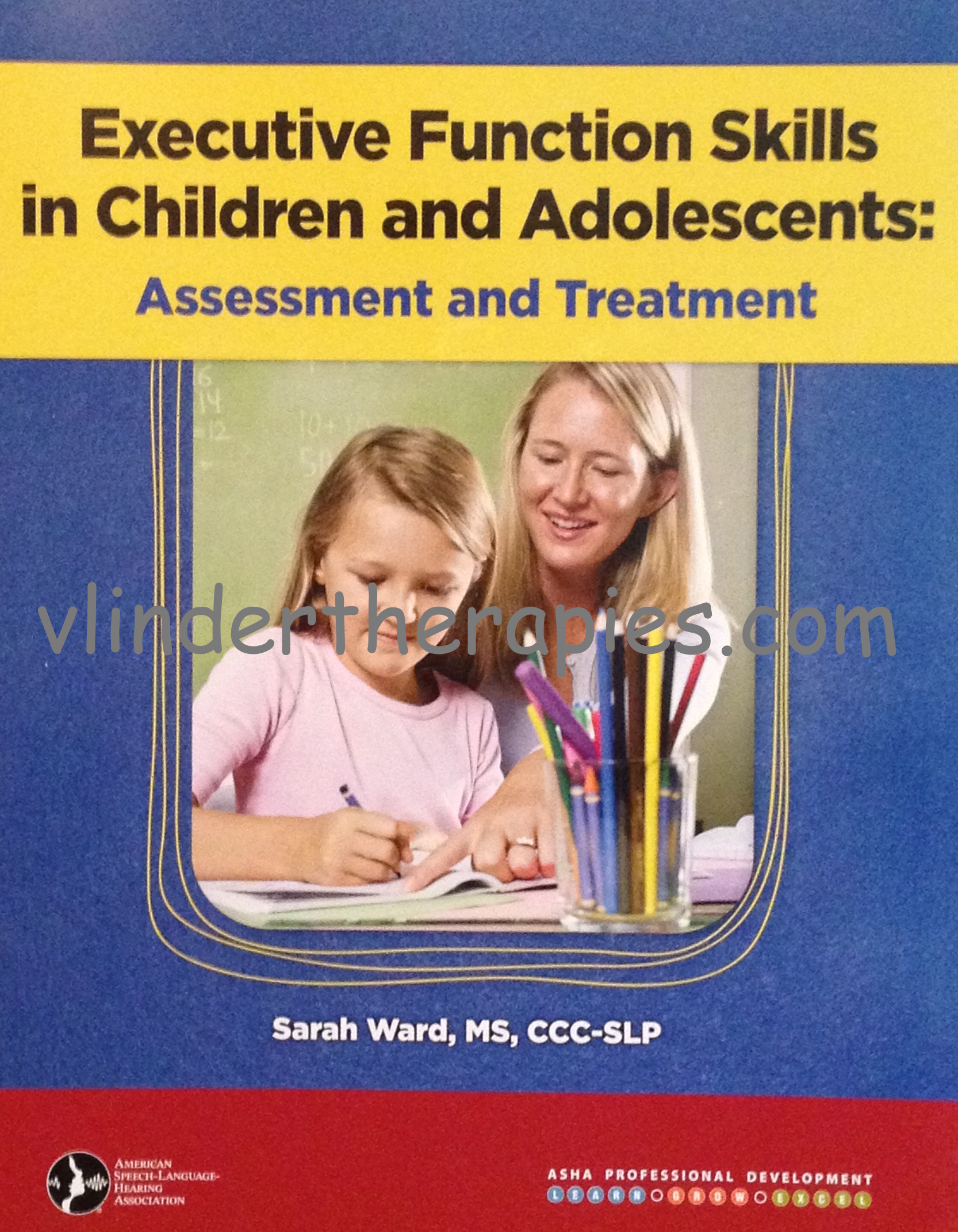Executive Function Skills in Children & Adolescents {Summary}
If you follow me on Facebook and/or Twitter, you may have noticed I've had executive functioning on the brain. Here's why:
Executive Function Skills in Children and Adolescents: Assessment and Treatment by Sarah Ward, MS, CCC-SLP
 I have had this self-study professional development course sitting in my to-do pile for longer than I want to admit. Not for a lack of interest, it just didn't seem to make it to the top of the pile. But time finally caught up with me and I needed to get it done before the deadline. So, now - it is finished!
I have had this self-study professional development course sitting in my to-do pile for longer than I want to admit. Not for a lack of interest, it just didn't seem to make it to the top of the pile. But time finally caught up with me and I needed to get it done before the deadline. So, now - it is finished!
Whew! It was 126 minutes jam-packed with information that came at lightening speed. At least that is how it felt to my tired "weekend brain". I started it thinking (hoping) it would be great information and good learning, but with no client in mind. I ended up with specific ideas to implement Monday with a specific client. Love that!
Have you heard of Sarah Ward? In case you haven't, she is a big name in the field of speech-language pathology. A "guru" on executive function. Go check out her website for more information.
So, what are executive function skills? They are those skills (brain functions) that allow us to do things like: anticipate consequences, initiate appropriate actions/responses, inhibit/stop behavior, monitor the success and/or failure of our behavior, and modify our performance based on incoming information. Did you know that executive function skills are not fully developed until 23 years old! They are developmental however, which means that we can compare current functioning to developmental norms to see if we are expecting too little, too much, or if the child is on target for age expectations.
Sarah presented a working definition as:
Executive control is the ability to: integrate a present awareness with forethought (image of the anticipated goal) and hindsight (episodic memory) to achieve a reasonable goal and plan, while managing, monitoring, and organizing the space, time, objects, and people around you.
Things to consider: Establish "relaxed alertness" so that the rational brain is in control. Talk less, which helps maximize working memory. Encourage awareness by developing self-talk and "if/then" future picture thinking. Teach the monitoring of time. Access past experience by considering how this is "the same but different". Foster independence in knowing the steps and strategies of "how to" (versus what to). Teach organization by starting with the big "future" picture, identifying the core features, which can then be fleshed out into the details when completing the task.
The key to improving executive function skills in children (and adolescents) is to teach and foster internal meta-cognitive "self-talk" skills. We need to teach kids how to think about and approach tasks. The number one goal of therapy for improving executive function skills is to improve their forethought and their ability to create a "future picture". We start with awareness. We teach the skills of predicting and creating a gestalt image of what something will look like. We do this in two ways:
- teach self-talk in the form of "If ... then ... therefore ..." language (we don't cue what to do to accomplish a task, we cue to know what to do)
- use visuals to help them develop imagery of the future gestalt (teach them to identify the key features - not specific details - to help them learn to create "future pictures")
A key difficulty for kids with executive control weakness, is of course time management. For every end goal, we need to teach them to make a "future picture". "If everything goes your way, what do you see? What does it look like?" We are asking them to identify key features that need to be included in the final product, breaking the task down into core parts. Then help them work from that gestalt "future picture" to estimate how much time it will take (add up the time per part). This can also help tasks feel more manageable/less overwhelming.
A couple of points I found interesting:
- Imaginative/make believe play skills help develop self-talk skills! Observe a child's play. Do they have a clear future goal? Are there complex schemes? Do they have a full plan? Can they take on multiple roles? Play is essential to the development of executive function skills!
- Many kids with executive weaknesses don't like to play games (e.g. board games). Many skills needed for successful executive control are involved in game plan. It is very important to practice games.
Helpful Resources Sarah shared (includes Amazon affiliate links):
Tools of the Mind: The Vygotskian Approach to Early Childhood Education (2nd Edition)
The Source for Development of Executive Development
Story Grammar Marker program by MindWing Concepts
Visualizing and Verbalizing by Lindamood-Bell
If you have the opportunity to hear Sarah Ward speak, I recommend it. I found this course to be well worth the time and money!
 Saturday, February 21, 2015 at 8:05PM
Saturday, February 21, 2015 at 8:05PM  Post a Comment →
Post a Comment →  executive function | in
executive function | in  Language
Language
Reader Comments